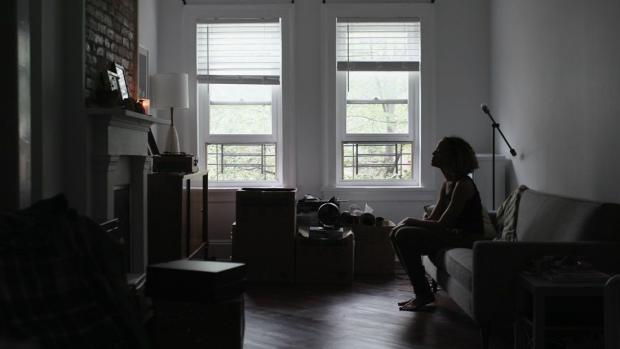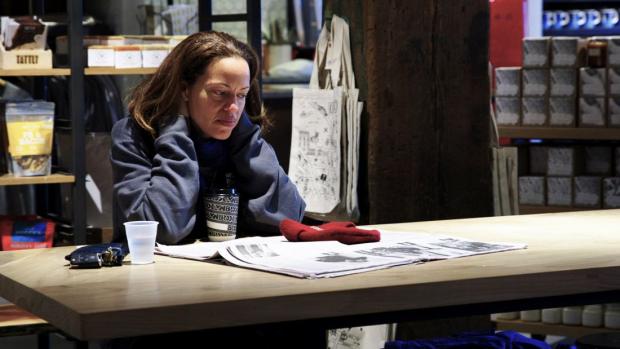Advertisement
The cleverly named On the Record threatens to dethrone the so-called “King of Hip-Hop.” The 97-minute documentary may be to music mogul Russell Simmons what the #MeToo movement and Ronan Farrow’s reportage have been to that other entertainment industry icon, Harvey Weinstein. But unlike the exposes of the disgraced movie producer, Record delves into matters of race, as well as of sex and gender.
Record’s protagonist is Drew Dixon, daughter of a 1990’s Washington, D.C. mayor, Sharon Pratt Dixon, and her father Arrington Dixon was a D.C. City Councilman. Growing up in the milieu of African American politics, Dixon saw Hip-Hop as a musical genre that expressed the voices, issues and concerns of Black people through an art form and decided to pursue a career in the music business. With an ear for talent Dixon rose in industry ranks, and she became an executive at Def Jam, the Hip Hop label co-founded by entrepreneur Simmons, who is also African American.
In On the Record Dixon and a number of other Black women go on the record, alleging Simmons sexually harassed and/or raped them (up to 20). The nonfiction film goes on to show how coming forward affected the silence breakers after the New York Times published their accusations, turning the women from victims into empowered individuals finally able to get on with their lives. As indicated above, their allegations have racial implications, which include sexist lyrics in Hip-Hop songs and imagery in music videos.
To be fair, the film also has a sequence featuring songs by white rockers, including the Beatles, Rolling Stones and Heavy Metal performers that would make feminists cringe. But Record treads where most if not all of the #MeToo and #TimesUp revelations have not gone before. Dixon and other Black female interviewees discuss how their decisions whether or not to expose Simmons was complicated by the consideration that doing so played into racist stereotypes of Black men as brutal, oversexed males. A shot of the teenager Emmett Till - brutally murdered by racists for supposedly whistling at a white woman in 1955 Mississippi - reminds us of how fraught and charged this racial trope is.
Thus Simmons’ accusers feared that some in the African American community would view those women disclosing their alleged victimization as “traitors… piling on” and “letting the culture down” - as British writer Bim Adewunmi puts it - by airing their dirty linen in public. Record includes clips of other Black women who’d previously claimed sexual misconduct by African American men: Boxer Mike Tyson was convicted of raping Desiree Washington, while Anita Hill contended her former boss Clarence Thomas harassed her during Senate confirmation hearings when he was nominated to become a Supreme Court justice. (The sordid Bill Cosby and R. Kelly sagas are not covered by the doc.)
Before she went public, Dixon mused that Hill’s stance was unsuccessful, saying: “I’ll never be that person to Russell Simmons. The Black community will hate me.” Dixon and the film’s other Black female victims, including #MeToo movement co-founder Tarana Burke, discuss how the women who publicly purport sex crimes become tainted because they have “tawdry words on their mouths” and are “associated with the vile acts” they are describing, while the men who purportedly committed the acts cover up by behaving “shocked… as is the public.”
(Incidentally, then-Senator Joe Biden, who was the Judiciary Committee’s chairman, is glimpsed in news footage of the 1991 hearings. During his current presidential race Biden has mused that he wished there was a way those hearings could have been fairer to Hill. Apparently, for 30 years it hasn’t occurred to Biden - who himself currently faces unsubstantiated accusations of sexual assault - that permitting the other women willing to testify against Thomas do so might have spared America from seating one of the worst justices ever on the Supreme Court.)
One of Simmons’ accusers, former model Sil Lai Abrams, also says she tried committing suicide after he raped her. When meeting with other purported survivors, Abrams pointedly notes that “We’re all light-skinned, conventionally attractive women” (many of whom are also tall and slim, with straight hair). Dixon, too, fits this look and appears to have green eyes.
Nevertheless, despite their hesitations, Dixon and other survivors decided to come forward with public revelations. Dixon also points a finger at another industry titan, Epic Records’ L.A. Reid, who in addition to allegedly harassing her, also passed up opportunities to sign Kanye West and John Legend early in their careers to his label. Dixon expresses the belief that Reid’s refusal ink deals with the artists who went on to become superstars at other labels was tied to her repeatedly spurning Reid’s sexual overtures.
Record is co-directed by two-time Oscar nominee Kirby Dick, arguably filmdom's top chronicler of sexual abuse. Dick’s 2012 The Invisible War, investigated rape in the U.S. military, while 2015’s The Hunting Ground did so on college campuses. Both films received Best Documentary Academy Award nominations and were co-produced by two-time Emmy winner Amy Ziering, who co-directed Record. Its executive producers include Abigail Disney, the scion of the animation dynasty who makes lefty productions. (All three are Caucasian, as is this reporter.)
If Record seems one-sided, it does not appear to be the filmmakers’ faults. Titles at the end of Record state that Simmons and Reid declined interview requests. (The press previously reported that Oprah Winfrey also pulled out from executive producing the documentary.) In addition, the titles state that Simmons has never been criminally charged with sexual misconduct and that both he and Reid deny the allegations of wrongdoing.
During an election year when the role Black women play in American society receives lots of attention, Dick and Ziering’s hard hitting documentary adds another rarely seen - and heard - dimension to that discussion, as On the Record breaks the color and sound barriers.
HBO Max is streaming On the Record as of May 27.


